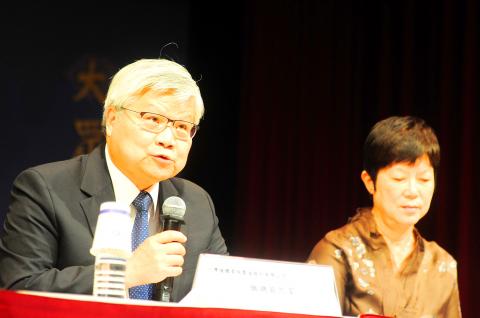Taiwan Semiconductor Manufacturing Co (TSMC, 台積電), the world’s largest contract chipmaker, yesterday said that it has fully recovered from a computer virus that struck the company on Friday evening last week.
Projected costs arising from the incident have been lowered to 2 percent of this quarter’s revenue, down from a previous forecast of 3 percent on Sunday, TSMC told a news conference at the Taiwan Stock Exchange in Taipei.
Gross margin would fall by 1 percentage point due to the cost of remedying the disruption to production, the company said.

Photo: Wang Yi-sung, Taipei Times
TSMC had previously forecast revenue of US$8.45 billion to US$8.55 billion for the third quarter, meaning losses would range from US$169 million to US$171 million, while gross margin is expected to be between 47 and 49 percent this quarter, down from its earlier guidance of 48 to 50 percent.
TSMC confirmed that the virus, which affected its fab tools, was a variant of the WannaCry ransomware worm.
TSMC said the incident occurred when new equipment was installed and connected to the company’s private network without first being scanned in an isolated system and cleared of viruses.
The WannaCry worm, which is known for its ability to spread rapidly, infected other fab tools at other plants via the company’s private network, TSMC said.
The advanced 7-nanometer fabs took the longest to recover from the virus, it said.
“The incident was caused entirely by a failure to follow protocol,” TSMC chief executive officer C.C. Wei (魏哲家) said, denying rumors it was a targeted cyberattack, the work of an internal agent or an act of sabotage via a USB drive.
Wei said the company has not received any ransom demands and none of its data were encrypted by the virus.
“We are in the process of revamping our security protocols, which would remove the possibility of such an error recurring,” Wei said, adding that the new system would be hardwired to block unverified nodes from connecting to the company’s private network.
“We do not expect these security upgrades to greatly affect operating expenses,” Wei said.
It is difficult to ensure that all of the company’s Windows 7 machines have been updated with the latest security patches, as the process requires collaboration with equipment suppliers and can only be performed during downtime, he said.
Wei declined to identify the fab tool that was initially affected, or its supplier, and whether TSMC would pursue legal recourse.
“We have installed tens of thousands of fab tools,” Wei said, adding that it is not normal for tools that have come straight out of the box to carry viruses.
“Our sole priority right now is to maintain clear communication with customers,” Wei said.
TSMC would not be exposed to breach of contract penalties from delayed shipments, chief financial officer Lora Ho (何麗梅) said.
Insurers only offer protection products for losses resulting from theft of customers’ personal data, a situation that does not apply to the TSMC incident, Ho said.
TSMC shares yesterday dipped 0.61 percent to NT$245.5 in Taipei trading.

In Italy’s storied gold-making hubs, jewelers are reworking their designs to trim gold content as they race to blunt the effect of record prices and appeal to shoppers watching their budgets. Gold prices hit a record high on Thursday, surging near US$5,600 an ounce, more than double a year ago as geopolitical concerns and jitters over trade pushed investors toward the safe-haven asset. The rally is putting undue pressure on small artisans as they face mounting demands from customers, including international brands, to produce cheaper items, from signature pieces to wedding rings, according to interviews with four independent jewelers in Italy’s main

Macronix International Co (旺宏), the world’s biggest NOR flash memory supplier, yesterday said it would spend NT$22 billion (US$699.1 million) on capacity expansion this year to increase its production of mid-to-low-density memory chips as the world’s major memorychip suppliers are phasing out the market. The company said its planned capital expenditures are about 11 times higher than the NT$1.8 billion it spent on new facilities and equipment last year. A majority of this year’s outlay would be allocated to step up capacity of multi-level cell (MLC) NAND flash memory chips, which are used in embedded multimedia cards (eMMC), a managed

Japanese Prime Minister Sanae Takaichi has talked up the benefits of a weaker yen in a campaign speech, adopting a tone at odds with her finance ministry, which has refused to rule out any options to counter excessive foreign exchange volatility. Takaichi later softened her stance, saying she did not have a preference for the yen’s direction. “People say the weak yen is bad right now, but for export industries, it’s a major opportunity,” Takaichi said on Saturday at a rally for Liberal Democratic Party candidate Daishiro Yamagiwa in Kanagawa Prefecture ahead of a snap election on Sunday. “Whether it’s selling food or

In the wake of strong global demand for AI applications, Taiwan’s export-oriented economy accelerated with the composite index of economic indicators flashing the first “red” light in December for one year, indicating the economy is in booming mode, the National Development Council (NDC) said yesterday. Moreover, the index of leading indicators, which gauges the potential state of the economy over the next six months, also moved higher in December amid growing optimism over the outlook, the NDC said. In December, the index of economic indicators rose one point from a month earlier to 38, at the lower end of the “red” light.